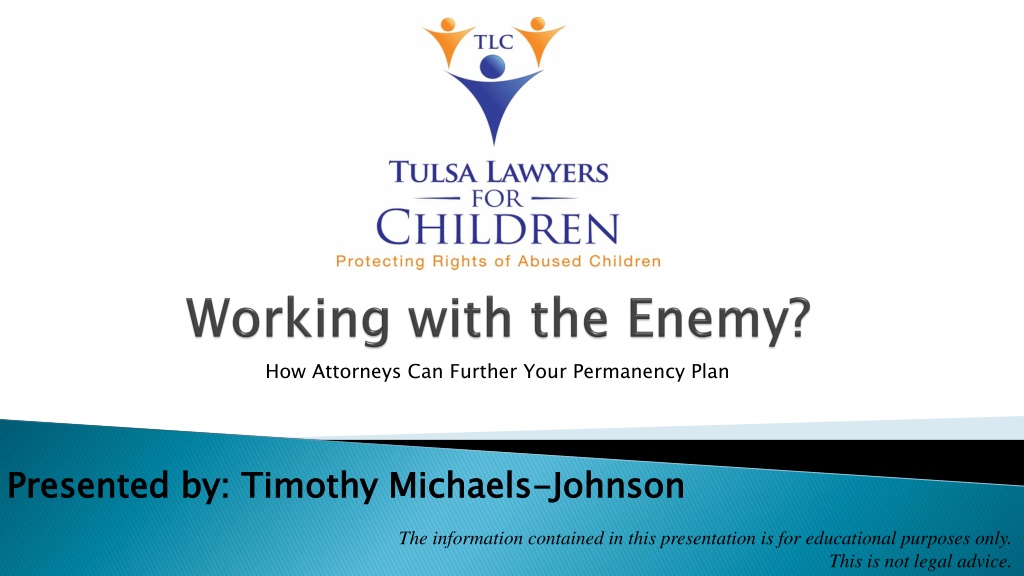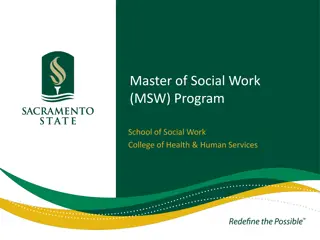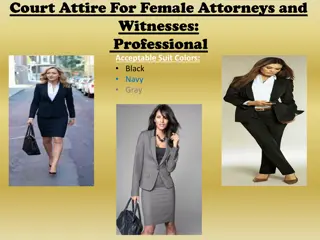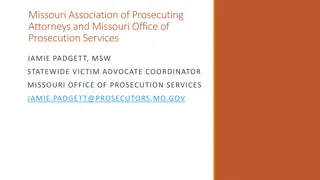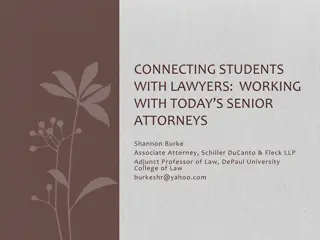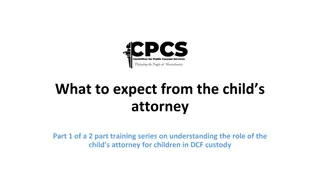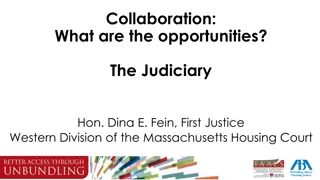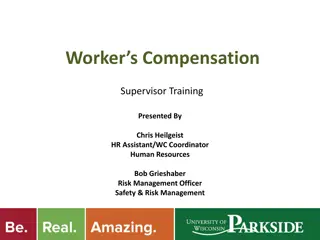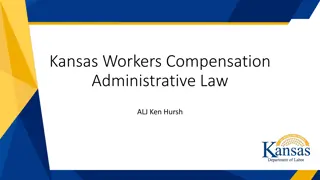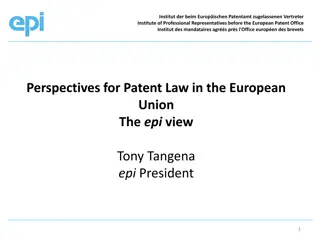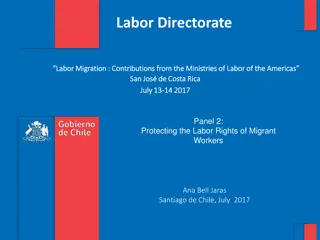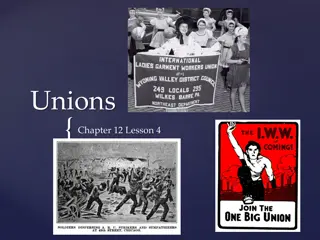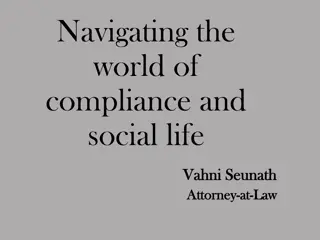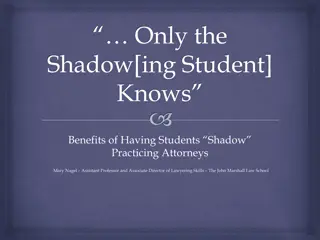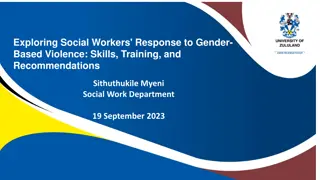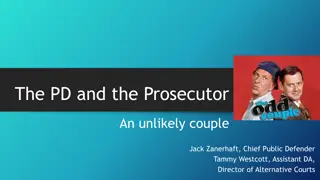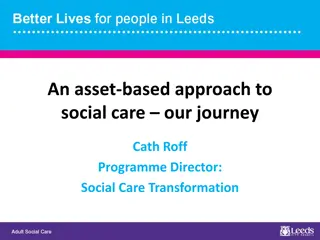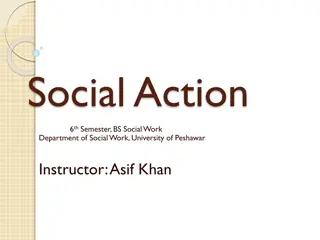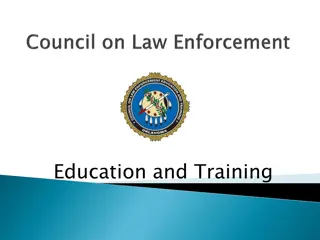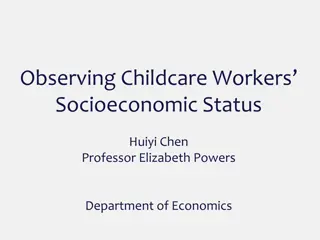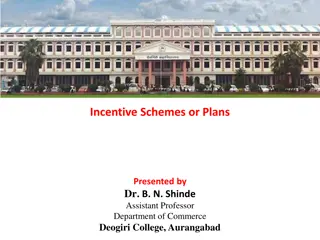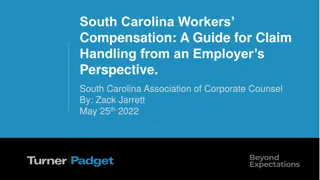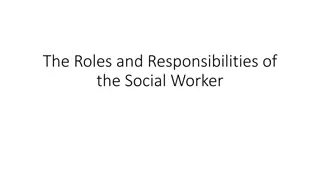Enhancing Permanency Plans: Collaborating between Attorneys and Social Workers
Attorneys and social workers can work together to further permanency plans for children under state custody, understanding each other's roles and interests. By advocating for the best interests and legal rights of children, this collaboration ensures a holistic approach to protecting vulnerable youth.
Download Presentation

Please find below an Image/Link to download the presentation.
The content on the website is provided AS IS for your information and personal use only. It may not be sold, licensed, or shared on other websites without obtaining consent from the author. Download presentation by click this link. If you encounter any issues during the download, it is possible that the publisher has removed the file from their server.
E N D
Presentation Transcript
How Attorneys Can Further Your Permanency Plan Presented by: Timothy Michaels Presented by: Timothy Michaels- -Johnson Johnson The information contained in this presentation is for educational purposes only. This is not legal advice.
Timothy Michaels-Johnson 5 years Tulsa County Prosecutor 4 years Representing Children Executive Director for Tulsa Lawyers for Children Tulsa Lawyers for Children Non-Profit representing abused and neglected children of Tulsa County Trains and Supports volunteer attorneys to represent children in DHS custody
A strange merger of law and social work Neither side can do it alone SOCIAL WORKERS Investigators Permanency Workers Therapists Foster Care Adoptions SOCIAL WORKERS LAWYERS District Attorney Child s Attorney Parent s Attorney Judge LAWYERS Multidisciplinary Team Adversarial Legal System But social workers and lawyers can be allies, not enemies Need to understand their roles and interests
Client: State of Oklahoma Interest: State's responsibility to protect children under 18 Role: Prepare and prosecute hearings within Title 10A Sources of Information: Permanency Worker reports, staffings Tribal Worker reports, staffings CASA - reports Service Providers provider reports Foster Parents foster parent reports Child and Parent s Attorneys (Advocacy) Decisions/Advocacy: Best Interest of the Child Legal Authority
Client: Minor Child Substituted Judgement Interest: Child s best interest Role: Advocate for the Child s best interest; Protect the Child s legal rights Substituted Judgement Expressed Interest Interest: Child s expressed wishes Role: Advocate for the Child s wishes; Protect the Child s legal rights Expressed Interest Substituted Judgement v. Expressed Interest Default is expressed interest Unless unable to express an interest due to age or incapacity Statutory Guidance Rules of Professional Conduct Judgment Call Substitute Judgment and determine a position which serves best interest
Sources of Information Permanency Worker reports, staffings Tribal Worker reports, staffings CASA - reports Service Providers provider reports Foster Parents Child Client State and Parent s Attorneys (Advocacy) Decisions/Advocacy: Interest of the Child
Client: Parent of the Child Interest: Expressed Interest of the Parent Role: Advocate for the Parent s wishes; Protect the Parent s legal rights Sources of Information Permanency Worker reports, staffings Tribal Worker reports, staffings CASA - reports Service Providers provider reports Parent Client State and Child s Attorneys (Advocacy) Decisions/Advocacy: Interest of the Parent
Client: None Interest: The legal and constitutional rights of the parties Role: Provide a fair and impartial venue to decide legal issues Sources of Information limited to information shared with all parties, usually in hearing (ex parte exceptions) Permanency Worker reports Tribal Worker reports CASA - reports Service Providers provider reports Parties to the Case (Advocacy) Decisions/Advocacy: Rights of the Parties Best Interest of the Child
Know your Permanency Goal Reunification Parent s Attorney Adoption District Attorney Guardianship Child s Attorney Know the Barriers Parents Child State Court Know your audience The person, not just the position The Judge may even be an ally
Communicate Attorneys need information to do their job well The better the information, the better the advocacy Talk to the attorneys Don t rely on emails or court reports to provide information Call the attorney Schedule a time to visit Meet the attorney for lunch Follow it up with an email documenting the conversation Ask questions communication is a two way street Attorneys love to poke holes in ideas use this to identify weak points Get clarification when an attorney takes a position you don t understand
Strategize Discuss how the law may help you achieve your goal Rebuttable presumption that reunification is in the Child s best interest Legislative Intent - a Child s best interest is the paramount consideration Discuss what social work can be done to help the attorney make their best argument What evidence does the attorney need how can this be obtained? What reasonable or active efforts are necessary to achieve a goal? What actions may actually harm proceeding to permanency?
Influence Parties Attorneys advocate for their clients, seemingly ignoring the obvious at times This is their job. BUT Attorneys also advise their clients Exert influence on a party by openly communicating with their attorney Even when an attorney appears to be disregarding the information provided, a good attorney is taking in the information and processing its impact on their client. This can lead to attorney-client conversations instigating necessary changes in behavior or even expressed interests.
Court Room Advocacy Communicating, Strategizing, and Influencing can t happen for the first time in the court room Attorneys have already spoken to their clients or formed their positions when a hearing begins Arguments made in the court room are for the Judge, not to convince other parties With proper preparation, your allied attorney(s) will be pushing your permanency plan for you, strengthened by legal arguments
When the District Attorney, the Childs Attorney, and the Parent s Attorney all disagree with your position First, reconsider your position and ask questions Second, if you are still right, look to the Judge as your ally Ex Parte Communication is not permitted, but Judges read your permanency reports before a hearing is held Use this to your advantage You should already know why the attorneys disagree Prepare a report with sufficient information to support your suggested course of action, with a focus on the Child s best interest Don t make legal arguments you are not an attorney (if there is a legal reason your suggestion can t be followed, you have already lost)
DHS Legal While they do not get involved in deprived cases, they can assist and advise DHS workers when issues arise DHS Court Liaisons In Tulsa County, DHS Court Liaisons are familiar with court procedures and attorneys that appear often www.tulsalawyersforchildren.org/resources Designed as a resource for TLC s volunteer attorneys May help with procedural questions Looking to add ICWA resources soon Registration is Free
